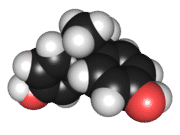BPA Linked to Cardiovascular Disease

Researchers have confirmed that the bisphenol A (BPA) is highly acidic — widely used in plastics including baby bottles and other drink containers — increases the risk of cardiovascular disease.
BPA is found in dozens of household products — from drink containers and food packaging to the lining of canned goods.
The vast majority of the U.S. population — over 90% — is exposed to the chemical by some means or another. It’s an endocrine disruptor that’s been shown to have both estrogen-agonist and androgen-antagonist activity.
So for the present study – National Health and Nutrition Survey 2006 – the researchers assessed information on 1,493 patients from the 2005-2006 NHANES data (their previous analysis looked at data from the 2003-2004 NHANES).
National Health and Nutrition Survey – Facts
They found that urinary BPA concentrations were lower than in the previous study (1.79 ng/mL versus 2.49 ng/mL).
Still, higher BPA concentrations were associated with coronary heart disease (OR 1.33, 95% CI 1.01 to 1.75, P=0.043).
Associations with diabetes were no longer significant, but pooled estimates over time did remain significant at P=0.001.
As for liver enzymes, the present study found no overall association with gamma glutamyl transferase concentrations. Again, pooled associations with alkaline phosphatase and lactate dehydrogenase remained significant.
Factors the contribute to heart disease
Philip Landrigan, MD, of Mount Sinai School of Medicine, who was likewise not involved in the study, said that recognizing lifestyle factors associated with heart disease — including smoking, hypertension, and obesity — have reduced the death rate from heart disease. Now, researchers are beginning to understand environmental acidic triggers for the disease as well. “Fine particulate air pollution, dioxins, and PCBs are three classes of chemicals that have been found within the past few years to be closely linked to heart disease,” Landrigan said in an e-mail. “Now with the publication of this paper, the evidence appears increasingly strong that BPA may be a fourth toxic chemical risk factor.”
How does BPA affect the heart?
The researchers said the metabolism of BPA may induce oxidative or acidic stress and endothelial or cover cell damage.
The researchers noted that the study was limited by its cross-sectional nature.
Michele Marcus, PhD, MPH, of Emory University, brought attention to this limitation.”It’s not clear whether the association is due to BPA or something else related to BPA exposure,” Marcus said in an e-mail. “For example, a major route of exposure to BPA is from the lining of soda cans. So people with diabetes might have higher BPA because they drink more soda.”
Canada Declared BPA Toxic
The government of Canada was the first to declare bisphenol A (BPA) to be a toxic substance, a necessary first step to limit the use of the chemical in Canada.
The decision comes on the heels of Canada’s first national physical study of BPA levels found in Canadian citizens, which revealed that 91% of Canadians have the chemical in their bodies, Teenagers are said to have the highest concentrations, with young children having the second highest.
Canada has performed several studies on BPA which point to serious health risks from exposure to it. Animal tests show that BPA can cause reproductive and behavioral abnormalities as well as impairing brain development. Evidence is strong that long term exposure to BPA contributes significantly to risks for cancers, obesity, diabetes, asthma, and heart disease.
Studies describe BPA as a synthetic form of estrogen which disrupts the endocrine system. Concerns over the effects of BPA have resulted in nationwide efforts to ban it from food and beverage containers, Canada first proposed to declare the chemical toxic in 2008, at that time the Canadian government proposed to ban the use of BPAs in baby bottles outright, and limit its use in formula cans.
Calls on the US EPA to ban or limit BPAs in the US have been underway since 2008 but the agency has yet to respond. An environmental group, the Natural Resources Defense Council, is suing the EPA alleging that the agency is dragging its feet on calls to ban BPA from food packaging.
Food industry groups oppose the ban, declaring that risks have been overstated. According to The New York Times, Canada’s move to ban the chemical was strenuously opposed by the chemical industry. Canada has taken additional steps to prevent BPAs from being discharged into the environment as industrial waste according to a report by Environment Canada. The decision is based on studies which show that BPAs do not decompose, and are harmful fish and other organisms in the aquatic environment.
Avoid BPA! See Life Ionizers™ line of BPA Free Bottles.